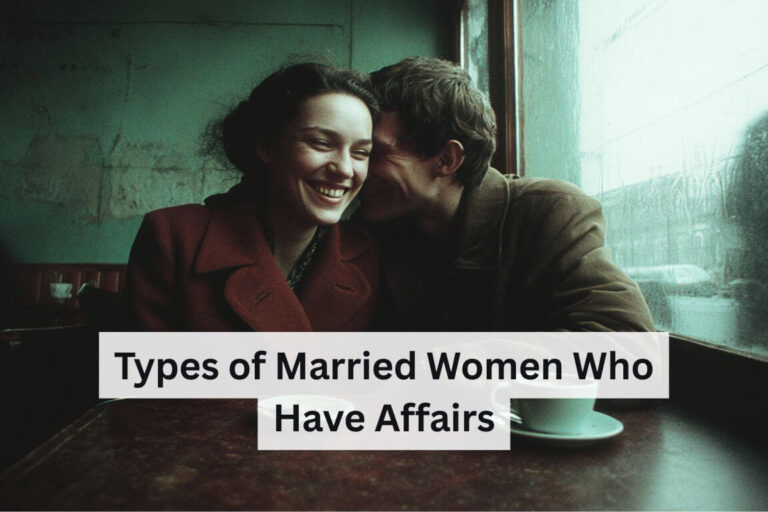Marriage is often portrayed as the ultimate destination of love, yet the reality is far more complex. While society tends to express more shock when women stray compared to men, the statistics tell a different story.
Recent research indicates that approximately 13% of married women admit to having extramarital affairs, with some studies suggesting this number could be as high as 16% during peak years.
The landscape of infidelity is shifting, particularly among younger generations where the gap between male and female infidelity is narrowing significantly.
Understanding the different personalities and circumstances that lead to extramarital connections isn’t about judgment.
Rather, it’s about recognizing patterns that many relationship experts have observed over decades of counseling couples.
Whether you’re seeking to understand relationship dynamics better or simply curious about human behavior, these insights shed light on a topic that affects millions of marriages worldwide.
1. The Emotionally Starved Soul
This woman feels like she’s living in an emotional desert. While her husband may be an excellent provider, she craves the deeper connections that make her feel truly seen and appreciated.
Research shows that 64.66% of women cite relationship unhappiness as their primary reason for infidelity, making this the most common type.
She’s often tried communicating her needs but feels dismissed or misunderstood.
When someone else comes along who listens intently to her thoughts, remembers small details about her day, and makes her feel emotionally valued, the attraction becomes magnetic.
She doesn’t set out to have an affair; she simply finds herself drawn to someone who fills the emotional void in her life.
The irony is that she often still loves her husband but feels invisible in her own home. She yearns for the kind of connection where she feels truly known rather than just appreciated for what she does.

2. The Revenge Strategist
Hell hath no fury like a woman scorned, and this type embodies that sentiment perfectly.
Studies indicate that 15.52% of women engage in affairs as a form of revenge, with women being five times more likely than men to cheat for this reason.
After discovering her partner’s betrayal or experiencing repeated emotional neglect, she decides that turnabout is fair play.
Her affair isn’t really about the other person; it’s about evening the score and making her husband feel the same pain she experienced.
She often chooses her affair partner strategically, sometimes even ensuring her husband will eventually discover the relationship.
While this approach rarely leads to genuine healing, it represents her attempt to regain some sense of power and control in a situation where she felt powerless.
The affair becomes her way of saying, “You’re not the only one with options.”
3. The Curiosity Seeker
This woman might actually be relatively content in her marriage, but she’s haunted by the question of “what if?”
She wonders what it would be like to be with someone different, to experience a different kind of chemistry, or to explore aspects of herself that remain dormant in her current relationship.
Her motivation isn’t necessarily dissatisfaction but rather a desire to explore uncharted territory.
She may have married young or has been with the same person for many years, and the allure of experiencing something completely different becomes irresistible.
This type of affair often starts as a mental exercise or emotional exploration before becoming physical.
She tells herself it’s just curiosity, but curiosity can be a powerful force that leads to unexpected consequences.
4. The Monotony Breaker
Marriage, especially with children, can become a relentless cycle of routines. This woman feels trapped in the sameness of daily life and desperately craves excitement and spontaneity.
Approximately 12.93% of women cite boredom or seeking novelty as their reason for having affairs.
She loves her family but feels like she’s lost herself in the endless cycle of responsibilities. An affair represents an escape from the predictable patterns of her daily existence.
The thrill of secret text messages, stolen moments, and the intoxicating rush of doing something forbidden awakens parts of herself she thought were gone forever.
For her, the affair isn’t necessarily about the other person but about feeling alive and unpredictable again.
It’s about reclaiming a sense of adventure and excitement that seems absent from her carefully structured life.

5. The Intimacy Refugee
Physical connection matters, and this woman has found herself in a relationship where her desires are consistently unmet or dismissed.
Sexual dissatisfaction accounts for 8.62% of women’s affairs, though the actual number may be higher due to social stigma around women expressing sexual needs.
She may have tried discussing her needs with her husband, but these conversations either fall on deaf ears or result in temporary improvements that quickly fade.
She doesn’t want to feel like she’s begging for intimacy in her own marriage, so she finds herself drawn to someone who makes her feel desired and sexually valued.
The affair becomes her sanctuary where she can express her sexuality without judgment or negotiation.
It’s not just about the physical act but about feeling genuinely wanted and appreciated as a sexual being.
6. The Validation Collector
This woman’s self-worth has taken a beating, either within her marriage or in other areas of her life.
About 6.90% of women seek affairs for validation, needing external confirmation that they’re still attractive, interesting, and worthy of pursuit.
She may be dealing with aging, career setbacks, or feeling overlooked in her daily life. When someone new shows intense interest in her, compliments her regularly, and makes her feel like the most fascinating person in the room, it becomes addictive.
The affair partner sees her through fresh eyes, unmarred by years of familiarity or taking each other for granted.
Her affair is less about dissatisfaction with her husband and more about feeling valuable and desired again.
She craves the intoxicating feeling of being someone’s priority rather than just another item on a to-do list.
7. The Exit Strategist
Sometimes an affair serves as a bridge between one life and another. This woman knows her marriage is ending but hasn’t yet made the official break.
Research shows that 6.03% of women have affairs when they know their relationship is ending.
She may be building emotional or financial resources for her eventual departure, or the affair might be her way of confirming that better relationships are possible.
In some cases, she’s unconsciously sabotaging her marriage because ending it directly feels too difficult or overwhelming.
The affair provides her with emotional support during a transitional period and sometimes gives her the courage she needs to finally leave an unsatisfying marriage.
It’s not necessarily about the affair partner becoming her next relationship but about having someone who reminds her of her worth during a difficult time.

8. The Opportunity Responder
This woman never planned to have an affair, but circumstances aligned in unexpected ways.
Perhaps she traveled frequently for work, spent extensive time with a colleague on a project, or reconnected with an old friend during a vulnerable moment.
About 7.76% of women attribute their affairs to opportunity, being under the influence, or momentary poor judgment.
What starts as an innocent friendship or professional relationship gradually becomes more intimate. She finds herself sharing personal details, confiding about her marriage, and slowly crossing boundaries she never intended to cross.
By the time she realizes what’s happening, emotional lines have already been crossed, making it easier to cross physical ones.
This type often experiences significant guilt because she genuinely didn’t set out to betray her marriage. The affair “just happened,” but that doesn’t make the consequences any less real.
9. The Power Reclaimer
Some women find themselves in relationships where they feel controlled, diminished, or powerless.
An affair becomes their way of asserting independence and reclaiming agency over their own lives and choices.
This might involve someone in a highly controlled marriage where every decision is monitored, or it could be a woman who’s gradually lost her sense of self within the relationship.
The affair represents her rebellion against feeling owned or managed by her spouse.
For her, the act of choosing someone else becomes a powerful statement of autonomy.
It’s her way of saying that she still has control over her own body, her own desires, and her own life choices, regardless of what her husband expects or demands.
10. The Grass-Is-Greener Believer
This woman is perpetually convinced that something better is always available elsewhere.
She may have a pattern of moving on when relationships become comfortable or routine, always believing that the next person will be more exciting, more compatible, or more understanding.
Even when her marriage is objectively good, she can’t shake the feeling that she’s settling for less than she deserves.
Social media doesn’t help, as she sees other couples who seem more passionate, more adventurous, or more aligned than she and her husband appear to be.
Her affairs often start as emotional connections where she explores whether someone else might be a better match.
She’s searching for that elusive “perfect” relationship, not realizing that no relationship maintains constant excitement without effort and commitment.
11. The Compartmentalization Expert
This woman has mastered the art of living multiple lives simultaneously. She genuinely loves her husband and family but has created separate mental and emotional spaces for different aspects of herself.
Her affair partner fulfills needs or aspects of her personality that she doesn’t feel comfortable expressing at home.
She’s often highly organized and capable of managing complex logistics without getting caught.
To her, the affair doesn’t necessarily threaten her marriage because she keeps the two relationships completely separate in her mind and heart. Each serves a different purpose in her life.
This type can maintain affairs for extended periods because she’s skilled at compartmentalizing emotions and experiences.
She may see herself as getting the best of both worlds rather than betraying anyone.

Understanding the Deeper Patterns
These categories aren’t meant to excuse infidelity or suggest that affairs are inevitable. Rather, they illustrate that infidelity often stems from unmet needs, unresolved conflicts, or personal struggles that haven’t been adequately addressed within the marriage.
Research consistently shows that women’s infidelity is most commonly linked to relationship dissatisfaction rather than attraction to affair partners.
This suggests that many affairs could potentially be prevented through better communication, genuine intimacy, and addressing issues before they become insurmountable.
The rise in women’s infidelity rates, particularly among younger generations, reflects changing social dynamics, increased financial independence, and evolving expectations of what marriage should provide.
Women today are less likely to remain in unfulfilling relationships simply because they’re married.
The reality is that every marriage faces challenges, and every individual has moments of vulnerability or dissatisfaction.
The difference lies in how couples address these challenges together and whether they’re willing to do the difficult work of maintaining genuine connection over time.
Understanding these patterns isn’t about predicting who will cheat but about recognizing that all relationships require ongoing attention, communication, and genuine effort to meet each partner’s evolving needs.
The strongest marriages are those where both partners remain curious about each other, committed to growth, and willing to have difficult conversations before they become impossible ones.
What patterns do you recognize in your own relationship? Sometimes awareness is the first step toward building something stronger and more fulfilling for both partners.


